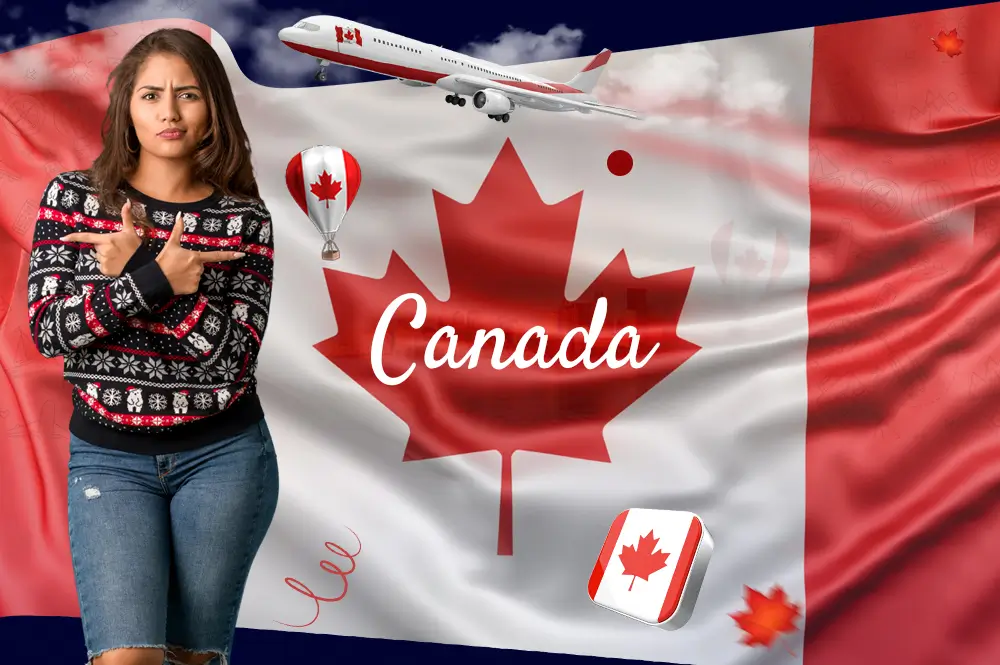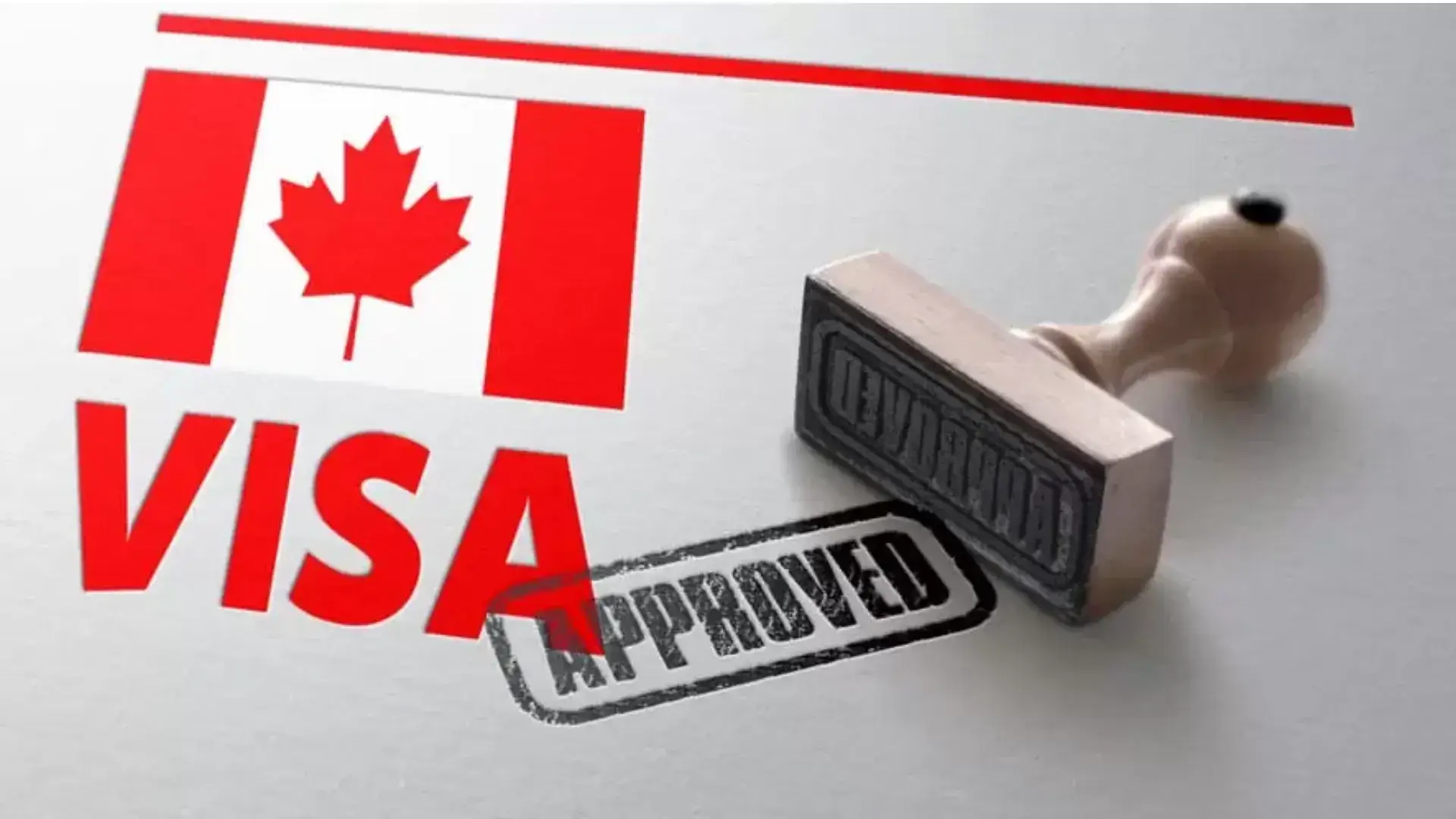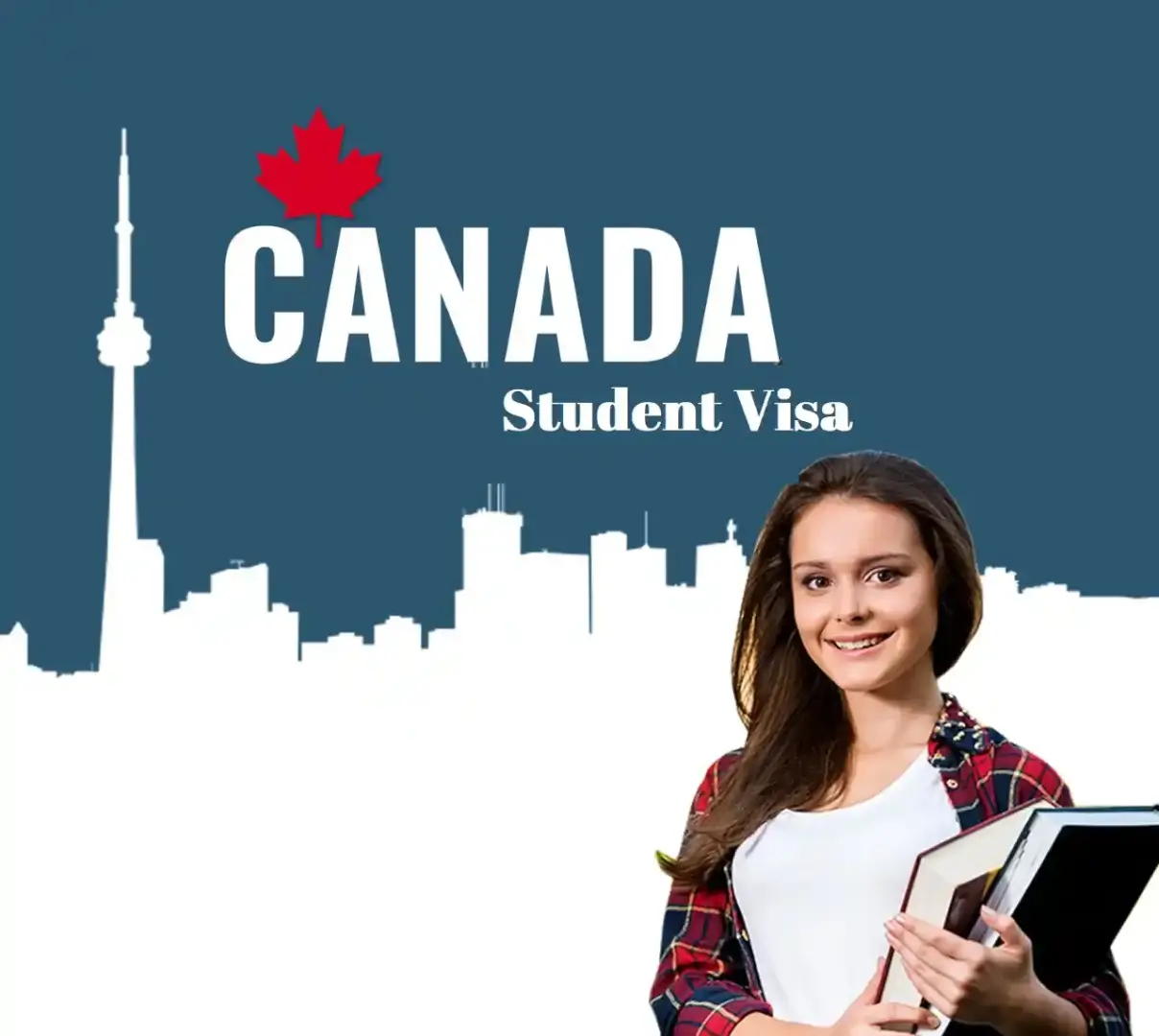Study in Canada

Study in Canada
According to a recent report, Indian students ranked second based on the number of students that migrate yearly to study in Canada for high-quality education. In recent statistics published online, thousands of Indian Students got their Canadian Student visas approved by IRCC (Immigration, Refugees and Citizenship Canada (IRCC)). Besides, thousands of people worldwide also migrate there to gain knowledge from its world-class education system.
Canada is well-known for its finest education system and actively strives to attract international students to study in Canada. The Canadian government wants to double the number of international students in Canada in the coming years, as it believes this will promote greater cultural exchange and international cooperation. To achieve this goal, the Canadian government has implemented many initiatives to make it easier for international students to come to Canada, including reforms to the immigration system and improvements to student services. These initiatives aim to make Canada a more attractive destination for international students and to ensure that they have a positive and rewarding experience while studying in Canada.

Want to study in Canada - Let's explore the nation first
- Canada's total area is 970610 km2 (that makes it the world's second-largest country)
- Situated in North America, having ten provinces and three territories
- Canada's estimated population is 3.82 crores (2021)
- Immigration to Canada: 492,984 arrivals (2021-2022) (2021)
- Ottawa is the Capital of Canada (located in Ontario)
- The Canadian dollar is divided into 100 cents (like the American dollar)
- The Parliament is in Ottawa and is comprised of the House of Commons (Lower House) and the Senate (The Upper House – whose members are appointed)
- The House of Commons has five officially known parties: The Liberals, Canadian Alliance, Bloc Quebecois, Progressive Conservatives, and the New Democratic Party.
- Canada is a part of the United Nations Security Council and counted as a non-permanent representative
- Canada is also a member of various international organizations, including NATO, OSCE, OAS, and APEC.
- Canada is a bilingual country, which makes it a prominent nation. Here, English and French languages are spoken widely.
- Safety and health measurements: Canada is known for its abundant natural resources, safety, and high standard of living. There is no shortage of groceries, accommodation, water, electricity, and other necessities to survive. So, students find only one place better than Canada for higher education.
- Cultural diversity: Canada is a multicultural country that offers students the freedom to embrace any religion. People are allowed to celebrate any occasion as per their religious status. This cultural liberty draws students' attention a lot. That's why students love to study in Canada and even stay there after completing their education.
- Life quality: Canada's population needs to be higher. So, living standards are much higher than in any other developed country. Vibrant cities in Canada are full of accommodation and plenty of food and transportation. Modern infrastructure, increased job security, and other enjoyable things for a comfortable lifestyle make Canada the most sought-after nation.
Why study in Canada
There are tons of reasons that make Canada an ideal place for investigations and living. Students get numerous advantages when they choose to study in Canada. Canada has a world-class education infrastructure and offers an easy PR process. Let's explore the key benefits of studying in Canada.
1. Canada - Home to top universities and colleges
Canada provides the best educational opportunities to students through a wide range of courses, streams, and advanced programs. It is the home to top universities and colleges that rank on the global list. The University of Toronto, The University of British Columbia, and the University of Alberta are a few of them. Students with Canadian degrees get job opportunities all around the world. Education in Canadian universities and colleges makes students efficient in the practical world. They learn to work in a team and adopt the best communication skills to survive in today's world of competition. They grow to become leaders and rule the world.
2. Low Cost of Studying in Canada
Canada is comparatively less expensive than the UK, Australia, and the USA, making it a favorable spot for study purposes. Tuition fees are also less in comparison to other countries. The average study costs range from CA$ 18000 to CA$ 20000 per year as per the length and stream of programs. Students find no financial barrier when they plan to study in Canada.
3. Canada scholarships for Indian students
Canadian universities also offer scholarships and help students financially. Students get a scholarship based on their needs and merit in their previous studies. Canadian scholarships involve Canada Graduate Scholarships, IDRC Research Awards, Banting Postdoctoral Fellowships, NSERC Postgraduate Scholarships, Dalhousie University Scholarships, HEC Montréal Scholarships, and more.
4. Working while studying in Canada
IRCC permits international students to work on-campus and off-campus during the course, which makes them financially independent. Students need no work permit during their studying time. It is an excellent way to encourage students and keep them moving.
5. Work Privilege through Post-Graduation Work Permit Program(PGWP)
The Canadian government provides a post-graduation work permit that allows students to work in Canada for up to three years after graduation without any restrictions. The job market in Canada is diverse, and students can find job opportunities in various industries, including technology, finance, healthcare, and many more. Salaries offered to students depend on their skills, experience, and qualifications. So there are plenty of jobs for deserving candidates.
6. Canada Immigration benefits – Express Entry and other schemes
Canadian immigration authorities offer a PGWP Program allowing students to stay and work in Canada once they complete their studies. Express Entry is a fast-processing PR program that facilitates students to get permanent residency in less time. The spouse and dependent VISA scheme also leverages students to unite with families. So, these flexible immigration services make Canada a convenient option for higher studies.
Get counseling Today from our Canada immigration experts!

Students who still have doubts and need help deciding why to choose Canada for higher studies must talk to VISA experts at Western Overseas. We assist students and let them find their solid reasons for studying in Canada. You can find us in Chandigarh, Amritsar, Jalandhar, Bathinda, Patiala, Ambala, Kurukshetra, Karnal, Sonipat, and Indore. Connect with us today and fly abroad to pursue your dream course.
Canada Student VISA Requirements from India
Canada is a popular study destination for Indian students. The country offers many advantages for those who want to study abroad. The Canadian government has a simplified process to apply for a student VISA in Canada. We will examine Canadian student VISA Requirements that Indian students need to fulfill on a priority basis before delving into the process.

Get counseling Today from our Canada immigration experts!
A student must meet specific requirements as per the Canadian Immigration Act and Regulations under normal circumstances to apply for a Canada study permit. We will discuss them thoroughly in our student visa guide.
Basic Requirements after 12th
- Students must have a minimum percentage per their course and university selection. More than 60% in 12th is a good score to get eligible for studying in Canada.
- Overall, IELTS 6 bands are accepted at most universities and colleges in Canada.
- With an overall 60 bands in PTE, students can easily apply to their interested study program and institution in Canada.
- A TOEFL score between 80 and 90 is good to qualify for education in Canada.
- LOR –Letter of Recommendation
Eligibility Criteria after Graduation
- Students must have a minimum percentage per their course and university selection. More than 60% in 12th is a good score to get eligible for studying in Canada.
- Overall, IELTS 6 bands are accepted at most universities and colleges in Canada.
- With an overall 60 bands in PTE, students can easily apply to their interested study program and institution in Canada.
- A TOEFL score between 80 and 90 is good to qualify for education in Canada.
- LOR –Letter of Recommendation
Complete Documentation to apply for a Canadian student VISA
1. Academic certificates and TRF scores (IELTS, PTE, TOEFL)
Identify proof: You must have a valid passport that should be eligible for the duration of your study program. At the time of online application, you need to upload a scanned copy of the passport page containing the basic information. You must also submit the original passport at the application office during the biometrics appointment for stamping purposes. Two passport-size photos are also required, with your written name and DOB on the back of the images.
2. Financial aids
- Students must have a minimum percentage per their course and university selection. More than 60% in 12th is a good score to get eligible for studying in Canada.
- Overall, IELTS 6 bands are accepted at most universities and colleges in Canada.
- With an overall 60 bands in PTE, students can easily apply to their interested study program and institution in Canada.
- A TOEFL score between 80 and 90 is good to qualify for education in Canada.
- LOR –Letter of Recommendation
3. GIC
It is mandatory to have a GIC (Guaranteed investment certificate) that provides short-term liquid investment. Many banks offer GIC on opening an account in their branch. Having GIC increases the chance of Canada study permit approval because it allows for the proof of funds to IRCC needed to pay your living expenses. You need to deposit CAD$ 20635 in Canada but in Quebec, students need to deposit CAD$15000 to open the account. ICICI Bank avails the facility to open a GIC account in India and provides you with the GIC.
4. Statement of purpose (SOP)
It is a written statement that justifies the goal of studying in Canada to officers. It adds
- The purpose of studying in Canada
- Your understanding of being a responsible student
5. Québec Acceptance Certificate
Students who are planning to enroll in the study program in Quebec for a duration longer than six months need to submit the certificate that CAQ
6. Guardian permission
Students below 18 years old need to submit a certificate that specifies the permission of their parents or guardians for abroad studies.
7. Medical certificate
8. Letter of Acceptance (LOA)
9. Provincial Attestation Letter(PAL)
How to apply for LOA – Letter of Acceptance to study in Canada
In Canada, before the students can apply for a study permit, they must first receive an acceptance letter, or letter of acceptance (LOA), from a Designated Learning Institution (DLI) approved by the Canadian government. Once a student receives an LOA from a DLI, they can apply for their study permit. This process can involve several steps that we will discuss in detail here. Let's start!
- he first step to applying for the offer letter in a DLI starts with some research to make a wish list of universities/colleges you want to enroll in.
- Canada has ten provinces and three territories in 5 different regions. Make your preferences for the province you want to settle in. Once you decide upon the area, you must pick colleges for your studies and choose a program. Select the right college/University and course per your last education qualification and stream.
- Students interested in PGWP (postgraduate work permit) programs must ensure that their chosen university offers PGWP. Be careful with that!
- After preparing a final list of the desired universities, it's time to apply for the offer letter. It is recommended to apply to at least 2-3 colleges simultaneously so that in case you get rejected from any college, there are chances of approval from other universities.
- Students can apply for an offer letter through official websites or hire a VISA consultant to enroll in the process. You need to submit the following documents to apply for the application.
2) Character certificatebr 3) Letter of recommendation (LOR): 2-3 from the principal, teacher, and program administrator
4) SOP (Statement of purpose)
5) CV (Curriculum Vitae)
6) Work Experience (if any)
7) Marriage certificate (in case married)
8) English proficiency proof (IELTS, PTE, TOEFL)
- he first step to applying for the offer letter in a DLI starts with some research to make a wish list of universities/colleges you want to enroll in.
- Canada has ten provinces and three territories in 5 different regions. Make your preferences for the province you want to settle in. Once you decide upon the area, you must pick colleges for your studies and choose a program. Select the right college/University and course per your last education qualification and stream.
- Students interested in PGWP (postgraduate work permit) programs must ensure that their chosen university offers PGWP. Be careful with that!
- After preparing a final list of the desired universities, it's time to apply for the offer letter. It is recommended to apply to at least 2-3 colleges simultaneously so that in case you get rejected from any college, there are chances of approval from other universities.
- Students can apply for an offer letter through official websites or hire a VISA consultant to enroll in the process. You need to submit the following documents to apply for the application.
Elements of LOA from a Canadian DLI
It is important to start the VISA process on the arrival of your LOA letter because it takes an extra 3-4 months to get your Canada study permit. A standard format of LOA includes the following details.
- he first step to applying for the offer letter in a DLI starts with some research to make a wish list of universities/colleges you want to enroll in.
- Canada has ten provinces and three territories in 5 different regions. Make your preferences for the province you want to settle in. Once you decide upon the area, you must pick colleges for your studies and choose a program. Select the right college/University and course per your last education qualification and stream.
- Students interested in PGWP (postgraduate work permit) programs must ensure that their chosen university offers PGWP. Be careful with that!
- After preparing a final list of the desired universities, it's time to apply for the offer letter. It is recommended to apply to at least 2-3 colleges simultaneously so that in case you get rejected from any college, there are chances of approval from other universities.
- Students can apply for an offer letter through official websites or hire a VISA consultant to enroll in the process. You need to submit the following documents to apply for the application.
Need personal assistance - Consult our Canada VISA Experts
Students looking for personal guidance can visit Western Overseas branches located in Chandigarh, Amritsar, Jalandhar, Bathinda, Patiala, Ambala, Kurukshetra, Karnal, Sonipat, and Indore for one-to-one sessions with the best Canada counselors. Feel free to call us and get VISA assistance from home. Students can also connect with us at our virtual VISA office. Book your preferred slot and talk to our visa consultants for Canada studies.
Canada Student VISA

It is the right time to distinguish between the terms "Canada study permit" AND "Canada student VISA" before indulging in the in-depth analysis of the Canadian student VISA application process.
What is a "Canada Study permit"?
A study permit in Canada is an official document required to pursue the study program at any designated learning institution. It is issued by the authority of Immigration, Refugees and Citizenship Canada (IRCC). It is requisite for all foreign nationals to obtain a Canada study permit before arriving in the nation.
Study permit OR Student VISA: Which term is correct?
Sometimes, students need to be more understood and consider a study permit as a Canada student visa. A study permit can't be used for entry formalities in Canada. The Canadian government issues a study permit with a visitor visa or an electronic travel authorization (eTA) required to enter Canada. In India, it is common to use both terms as synonyms.
Should you apply for a study permit?
There are many reasons a candidate doesn't need to have a study permit that involves
- being a family member or employee of overseas delegates
- Being a member of the army in Canada
- Registered Indians in Canada
- Minor students in Canada
- Continue the studies: Having a study permit allows you to continue studying if study circumstances alter.
- Getting permission to work during the course: You can work on-campus and off-campus with a study permit. Otherwise, you can't work during your entire study program.
How to apply for a student VISA in Canada?
Before applying for a study permit, ensure you have all documents ready for submission at the official website we discussed in our previous guide for Canadian student VISA requirements. Study permit should be applied 3 to 4 months before the beginning of your study program. Applying for a "Canada study permit" starts with creating a user account at the official IRCC website. According to your location, you need to choose Outside Canada OR Inside Canada for the application. Continue with online mode to lodge your VISA application
Step 1: You must have a scanner and camera to make soft copies of your documents during your online study permit application process. Also, you will need a credit or debit card for online payments.
Step 2: Pay attention to each guideline to avoid the tiniest mistakes while filling out the forms. "Read the instruction guide" is available on the portal to help students.
Step 3: You need to answer some questions before uploading the documents. So be careful and faithful while answering.
Step 4: Review answered questions before continuing to the final stages. It helps you to correct the wrong answer. So go ahead only after examining the answer page.
Step 5: Upload the document as mentioned in the form and go to the last step.
Step 6: Pay the mandatory charges at the final stage. It involves application fees and biometrics fees.
Study permit Application fees: 150 $
Biometrics fees: 85 $
Additional fees: There is an additional fee for medical examination, police inspection, and English language proficiency test. But if you get these services done outside, you don't need to make the payment online. Directly submit these certificates online.
Canada Student VISA Processing Time: It takes up to 14 weeks for the final decision on the study VISA application. The processing time involves checking and verifying the details and documents for approval from the embassy.
Biometric letter: Students get a letter for biometrics in their account message portal within 24 hours once they submit the form. They need to visit the biometric collection office physically by booking an appointment. Once you fulfill the formalities, the application starts getting reviewed.
Step 7: Application Approval/Rejection
The Canadian embassy issues the "letter of introduction" through the mail that verifies a student is allowed to study in Canada if it finds everything genuine and legal in the VISA application. You need to show this letter to the border service officers at the Canadian airport, and they issue the study permit at the port. The Canadian Student immigration authority also sends an eTA or visitor visa to enter Canada.
The embassy sends a letter describing the refusal reasons regarding Canada's study permit rejection. The reasons that lead to denial are:
- Not able to show enough funds to support education
- Fail to pass the medical examination
- Not able to convince the visa officer of your purpose of the study
